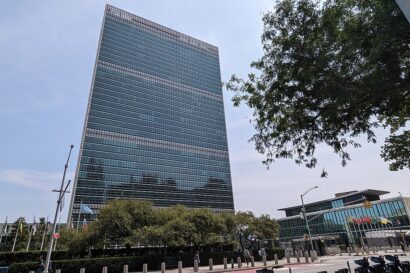Nigeria is one of the fastest-growing online nations on earth, with 91.6 million Nigerians online as of mid-2017, according to the country’s Communications Commission. But taxing this digital domain is still very much in the analogue era. Akintunde Agunbiade, Tolu Dada, Emmanuel Faith, Oreniyi Adesewa, Solomon Nzere, Ikusika Bamidele, Omotoso Feranmi, Anifowose Jadesola, Adelabu Adepeju, and Francis Ololuo, students at Obafemi Awolowo University, Ile-Ife and members of its Tax Club, examine what can be done to tax companies which don’t have a physical base in the country.
According to Ovum, a UK-based research and analytics firm, from 2012 to 2018, OTT (Over-The-Top) service providers, including Facebook would have gained over 109 trillion naira from Nigeria, untaxed.
Nigeria and over 170 other nations are losing billions of tax revenue due to the obsolete requirement for a fixed base or permanent establishment before a company can be taxed. The biggest beneficiaries of this unintended oversight are digital companies like Facebook who do not require a physical base before carrying out their operations.
What is a fixed base?
In the Nigerian case of Shell International Petroleum BV v. Federal Board of Inland Revenue (FBIR), the apex court defined a fixed base to be a place where a company has carried on business for a long time, notwithstanding that it is not the owner of the place. Paragraph 4.1 of the Federal Inland Revenue Service Circular 9302goes further to state that this base must be easily identifiable and possess some degree of permanence. Going further, section 13(2) of the Nigerian Companies Income Tax Actprovides that a company can only be taxed if its profits are attributable to the fixed base. But when a company does not have a physical structure as required by the law, how can its be profits be taxed, even though it is quite clear to everyone that the company is reaping bountifully from the country? Before going into this, an expose into the tax planning method of Facebook will be presented.
Facebook’s tax planning method
At the core of Facebook’s tax planning structure are two companies; Facebook Ireland Limited and Facebook Holdings Limited. In 2012, Facebook Ireland, with an employee base of 382 people, generated profit worth €1.79 billlion. This turned into a pre-tax loss of €626,000 after it paid royalties to the tune of €1.75 billion to Facebook Holdings, for the use of the intellectual property central to the technology platform. Facebook Holdings also does not pay taxes, because its tax domicile is in the Cayman Islands, which is tax-free. At the end of it all, Facebook paid a tax bill of only €1.9 million to Irish tax authorities.
This approach is known as the ‘Double-Dutch’ or ‘Double-Irish’ Approach.It is largely employed by intellectual property corporations like Facebook. It involves shifting income from a region of higher tax liability to one of lower tax liability, mostly Ireland or Netherlands. For the system to work, two companies must be set up, one being the subsidiary of the other. One of these companies will then need to have its residence for tax purposes in a tax haven. The parent company will own the right to exploit intellectual property. It then licenses the subsidiary to exploit this intellectual property for a steep fee as royalty, which is not taxable. The subsidiary then declares little or no profit, and may then pay tax in Ireland at the local tax rate of 12.5%.
This trend has not gone unnoticed by many nations of the world. Some countries have taken steps to ameliorate this. We will now present a few of them.
How countries have tackled the tax planning methods of digital companies
There are a range of options for combating these strategies. The United Kingdom has introduced a Diverted Profits Levy quantified at 25%. The State of Mato Grosso, Brazil, imposes goods tax on internet downloads.
On the 1st of October, 2015, Japan introduced a new set of consumption tax rules applicable to overseas businesses providing digital services to the Japanese market.
In Israel, the Israeli Tax Authority (ITA) has issued a circular that provides that where a company relies significantly on the internet to provide its services, its activity will constitute its fixed base. Colombia has imposed a 19% VAT on digital services which is collected by the banks processing payments before sending out the proceeds.
These are just few countries that have taken steps to tax digital companies. We shall now conclude with the recommendations for the taxation of digital companies in Nigeria.
Recommendations
First of all, we need to define the base in law. Section 13(2) of the Companies Income Tax Act should be amended to provide that in respect of digital companies, their fixed base will be their subscriber or user base. In other words, the higher its number of users, the higher its tax liablity. To determine the correct number of subscribers per internet platform, the tax authorities will need to liaise with telecoms companies.
Secondly, the tax authorities may proceed to impose VAT on such companies which will be collected by the payment services operators such as Interswitch, Paga etc.
To sum it all, Nigeria must take up the gauntlet and bring its laws in line with 21st century realities, because as Yomi Olugbenro, West Africa Tax Leader at Deloitte has said, ‘Digital is the new rule of business’.


